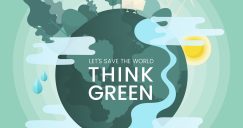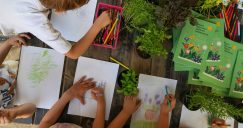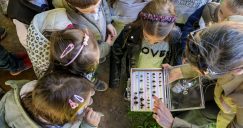Empowering Climate Awareness through STEAM at Slovenian Learning Venture: A New Approach to Food and Sustainability

- Slovenia
In the face of escalating climate challenges, education must not only inform but inspire action. At the Slovenian Learning Venture, OpenLab, led by the Kersnikova Institute, is transforming how we address food systems and sustainability. By combining STEAM (Science, Technology, Engineering, Art, and Mathematics) with hands-on learning, OpenLab empowers young people to become active, informed changemakers in the fight against climate change.
OpenLab integrates expert knowledge with the creativity of mentors running STEAM workshops at RampaLab. It takes an interdisciplinary approach to sustainable food production, blending theory and practice. Participants gain the tools, skills, and insights to connect scientific inquiry, innovation, and personal responsibility, enabling them to create meaningful solutions for a sustainable future.
A Hands-On, Interdisciplinary Approach to Food Systems
STEAM education is a powerful tool for climate literacy, especially concerning the food we grow and consume. OpenLab encourages participants to question not only the science behind food production but also the environmental and social factors that influence it. By combining scientific inquiry with artistic exploration, students learn to view food production from multiple perspectives. They ask critical questions like, “What makes farming practices more sustainable?” and “How do our food choices impact ecosystems?” This interdisciplinary approach fosters a holistic understanding of food systems, preparing students to think critically about the future of food.
Through hands-on activities like growing spirulina algae or cultivating mushrooms, students explore how small-scale, sustainable food production can complement larger systems. These activities illustrate how everyday actions can lead to meaningful changes in food production practices.
Inspiring Environmental Responsibility through Food Literacy
In OpenLab, food literacy connects students to broader climate education. They explore how everyday choices—like eating local, seasonal produce—impact the environment. Workshops focus on understanding the carbon footprint of foods, how regenerative farming supports soil health, and how reducing food waste lowers emissions. This approach encourages students to recognize the significance of their choices and fosters responsibility for supporting sustainability.
Practical activities, such as making food with algae-based dough or using self-grown mushrooms, allow students to apply their knowledge of sustainable food practices. These activities highlight the journey of food, teaching that it doesn’t just appear on store shelves—it requires resources, labor, and sustainability to reach the plate.
Empowering Young Leaders for Sustainable Change
At its core, OpenLab seeks to nurture a generation of proactive, informed leaders. Through the STEAM framework, students don’t just learn about climate issues—they engage with them firsthand. They design projects addressing local sustainability challenges, such as food waste reduction initiatives or school gardens. These experiences build confidence, showing students they can make a difference in their communities.
By collaborating with experts and mentors, students identify food-related climate issues, such as sustainable food production in their local areas. These reflections allow them to develop concrete solutions, gaining tools to become leaders in sustainability and take ownership of building a resilient food system.
Conclusion: A Holistic Approach to Climate and Food Education
OpenLab offers a dynamic, integrated approach to climate education, combining STEAM with the urgent need for sustainable food production. By focusing on both the science and creativity behind food systems, the program prepares students for the complexities of a changing climate. Through hands-on projects, systems thinking, and technological innovation, OpenLab empowers young people to become active changemakers, contributing to a sustainable and resilient world.






